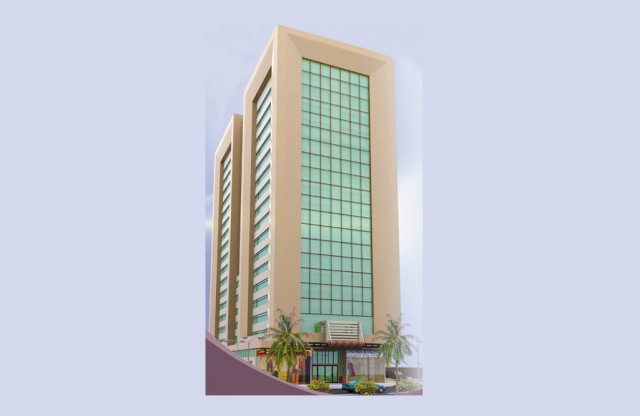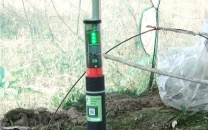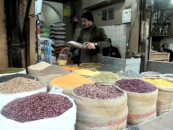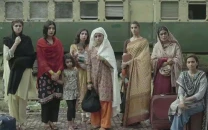In search of the Jews of Karachi
The Jewish community has faded into obscurity, with nothing but a few landmarks left to remind us of its existence.

In search of the Jews of Karachi
The object of their affection is the 19th century Merewether Tower on II Chundrigar Road, dwarfed now by tall buildings in the city’s busy financial area, but still unique due to its design. In the middle of the tower is an engraved Star of David, set in stone. Some upholder of religion has thoughtfully spray painted Yahoodi (Jew) on the tower, perhaps to mark it for demolition in the future.
During the British Raj, there was a small but vibrant Jewish community in Karachi, which was renowned even then for being a multi-ethnic city. One member of the Jewish community, Abraham Reuben, was even elected to the post of councilor of the Karachi city corporation, the forerunner of the KMC, in 1919. Many members of the community left after the founding of Israel and more left after the Arab-Israeli wars led to increased anti-Jewish feeling in Pakistan. Of those who remained, many succumbed to old age and disease, but urban legend has it that a few still live on in deliberate obscurity. And those who died here have left their mark on the land.
Walking into the Jewish cemetery in Mewa Shah, Karachi, one is greeted by a family sitting on a charpoy, soaking in the sun. “Is this the Jewish graveyard?” I ask. A young boy lisps back, “This is the Israeli graveyard”. To him, the meanings of Jewish and Israeli are interchangeable.
Muhammad Ibrahim, the 62-year-old caretaker of the cemetery, was born in a small room located inside the cemetery. “We’ve spent our entire lives here. My parents, now long dead, also lived here.”
Funds to maintain the cemetery are drying up. “Some people come once a year, they donate money and leave. We’ve paid for some of the maintenance ourselves such as the construction of the boundary wall around the cemetery,” says Ibrahim.
Nearly 5,000 graves are present here. Many are broken, and nettles and thorns adorn the site. “A woman named Rachel used to come here. But we’ve been told that she’s moved to London now.”
Mehrunissa, a wizened old woman, is a member of one of the six families that live on the cemetery’s grounds. Raving against the government for neglecting the place, Mehrunissa says the land mafia has repeatedly tried to take over the land. “We have repeatedly filed First Investigation Reports with the police about this. We’re the ones who have been safeguarding this place. Why doesn’t the government do anything?”
Ibrahim shows me around the cemetery; in a room lies the grave of Solomon David, an official of the Karachi Municipal Corporation, who also built the Magain Shalome synagogue in Saddar. The room also doubles as a storeroom for a pile of twigs, a clock with no hands marks the time. “The last burial here was in the 1980s,” says Ibrahim. Some Jewish people were present in the city, according to Ibrahim, but have married within Muslim families.
There was once a Jewish synagogue here too — according to Karachi’s residents, who had seen it. It was a small building located at Nishtar Road in Saddar. However, it was torn down in the 1980s, and a shopping plaza now stands in place of the synagogue.
Byram Avari, a prominent member of the Parsi community, says there are now no Jews left in Karachi that he is aware of. “There were prominent Jews here, one used to be a pilot at the Karachi Port Trust. I had a friend at school who was Jewish, they used to tell people they were Christians. They moved to Canada, and that’s where he passed away. There was a Jewish synagogue in Manora, and the Jewish graveyard in Karachi. The Jewish families used to tell people that they were Christians because their features resembled them, and they wore shalwar kameez.” Avari says he had heard there was a woman who used to pay for the maintenance of the Jewish graveyard, but says he has no contact with any Jewish family in Pakistan.
Being a Jew in today’s Pakistan would be living a life fraught with fear and constant persecution. The term Yahoodi (Urdu for Jew) is frequently tossed around as a curse word. Dozens of personalities have been accused of being part of the Jewish lobby, and rightwing op-ed writers have frequently accused the Jewish lobby (whatever that may mean) of being responsible for Pakistan’s woes. From former President Pervez Musharraf to human rights lawyer Asma Jahangir, the Jewish lobby has sponsored all and sundry according to the colourful imagination of the right-wing. At protests, the Israeli flag is frequently burned, and slogans are raised against the Jewish community. In drawing rooms, discussions about the veracity of the Holocaust come under debate. In such circumstances, it is little surprise that the small Jewish population lived a life of obscurity, or migrated to Israel and other countries.
Ardershir Cowasjee, a prominent columnist and member of the Parsi community says that there were very few Jewish families left in Karachi, and most of them have passed away. Arif Hasan, renowned urban planning expert, says many left the country after the anti-Israel campaign. “There were Jewish cabaret artists and film actresses in the city, along with bureaucrats. The bureaucrats left in the 50s, the cabaret artists in the 70s,” says Hasan. The Roma Shabana nightclub that once stood on Frere road also boasted two Jewish cabaret dancers, who later faded into obscurity.
Attempts to contact members of Jewish families that lived in Karachi were in vain. Prominent architect Yasmeen Lari, who is working on a project to conserve the city’s historical buildings, did not have any pictures of the Jewish synagogue that once existed in the city. Hasan says there is only one known picture of the synagogue that has been circulated on the Internet on various blogs.
“People come here and take pictures, but no one comes to help us maintain this place,” complains Ibrahim as I leave, “but we will continue to do so.” As one looks at the state of disrepair that the Jewish cemetery and the Merewether Tower exist in, one can only hope that these symbols of a once vibrant Jewish community remain for the next generation of Pakistanis to witness.
Published in The Express Tribune, Sunday Magazine, February 6th, 2011.



















COMMENTS
Comments are moderated and generally will be posted if they are on-topic and not abusive.
For more information, please see our Comments FAQ